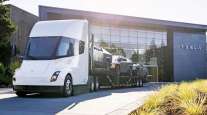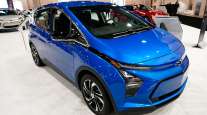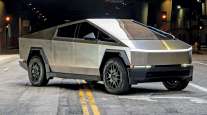Tesla Looks to Trucking for Ways to Accelerate Deliveries of Model 3 Cars

Elon Musk is doing everything he can to speed up deliveries of the Tesla Model 3, including the tantalizing prospect that he may have purchased a trucking company to augment capacity provided by existing vehicle haulers.
The Tesla CEO took to Twitter and described the effort to deliver as many cars as possible before the end of the year when the federal tax credit of $7,500 for the purchase of electric cars is slated to be cut in half.
“Tesla just acquired trucking capacity to ensure Model 3 can be delivered in U.S. by Dec. 31 if ordered by Nov. 30,” Musk said in a tweet on Nov. 15. When asked to elaborate, he replied, “We bought some trucking companies [and] secured contracts with major haulers to avoid trucking shortage mistake of last quarter."
Tesla just acquired trucking capacity to ensure Model 3 can be delivered in US by Dec 31 if ordered by Nov 30 https://t.co/npmPuSXNWC
— Elon Musk (@elonmusk) November 15, 2018
While a number of trucking industry sources said they are unaware of any acquisitions by Tesla, one carrier executive told Transport Topics that his company has hauled vehicles for the Fremont, Calif.-based electric carmaker “as many auto carriers have.”
In a series of follow-up tweets, Musk explained the rationale for using trucks instead of railcars to make deliveries.
“Skipping rail saves over a month for East Coast deliveries,” he said. “All things considered, it’s better to use trucks. Single load/unload [and] direct to owner location.”
Part of the issue for all car haulers is a lack of rail capacity, according to Bob Farrell, executive director of the Automobile Carriers Conference of American Trucking Associations.
“The problem is the shortage of bi-levels [railcars] for SUVs and pickups,” Farrell noted, “which would not affect Tesla as they use the tri-level railcars.”

Musk
Musk later tweeted a message about how cars would be shipped to customers outside of the United States:
“Will also be using dedicated roll-on, roll-off fast ships for transporting cars to Europe and Asia in Q1,” Musk said. “Major focus on minimizing time from factory to new owner. Did not fully appreciate the working capital impact until recently.”
Vehicle delivery and logistics have been major issues for Tesla as production of the Model 3 has ramped up in recent months.
Tesla delivered 56,065 Model 3s to customers in the third quarter, according to a filing with the U.S. Securities and Exchange Commission. Total vehicle deliveries were almost 70,000, generating revenue of $6.1 billion in three months ended Sept. 30.
“Vehicle delivery and logistics were our main challenges in Q3 as our delivery system went through a similar ‘ramp’ to what our production system went through in Q2,” the company stated in the filing.
One of the changes made in the quarter was to expand the number of direct deliveries where an employee delivers vehicles to the front door of a customer’s house or office.
“We will have to stabilize and sustain our delivery and logistics model to deliver an increasing number of vehicles, and we have only limited experience with this at scale, particularly in markets outside of North America,” the company acknowledged. “Moreover, if our growing fleet of customer vehicles, particularly Model 3, experiences unexpected reliability issues, it could overburden our servicing capabilities.”




